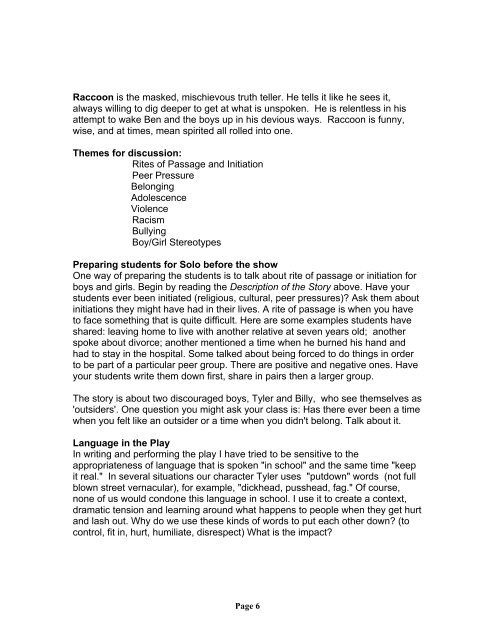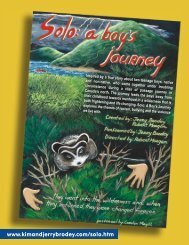SOLO STUDY GUIDE May 2008 - Kim and Jerry Brodey
SOLO STUDY GUIDE May 2008 - Kim and Jerry Brodey
SOLO STUDY GUIDE May 2008 - Kim and Jerry Brodey
Create successful ePaper yourself
Turn your PDF publications into a flip-book with our unique Google optimized e-Paper software.
Raccoon is the masked, mischievous truth teller. He tells it like he sees it,always willing to dig deeper to get at what is unspoken. He is relentless in hisattempt to wake Ben <strong>and</strong> the boys up in his devious ways. Raccoon is funny,wise, <strong>and</strong> at times, mean spirited all rolled into one.Themes for discussion:Rites of Passage <strong>and</strong> InitiationPeer PressureBelongingAdolescenceViolenceRacismBullyingBoy/Girl StereotypesPreparing students for Solo before the showOne way of preparing the students is to talk about rite of passage or initiation forboys <strong>and</strong> girls. Begin by reading the Description of the Story above. Have yourstudents ever been initiated (religious, cultural, peer pressures)? Ask them aboutinitiations they might have had in their lives. A rite of passage is when you haveto face something that is quite difficult. Here are some examples students haveshared: leaving home to live with another relative at seven years old; anotherspoke about divorce; another mentioned a time when he burned his h<strong>and</strong> <strong>and</strong>had to stay in the hospital. Some talked about being forced to do things in orderto be part of a particular peer group. There are positive <strong>and</strong> negative ones. Haveyour students write them down first, share in pairs then a larger group.The story is about two discouraged boys, Tyler <strong>and</strong> Billy, who see themselves as'outsiders'. One question you might ask your class is: Has there ever been a timewhen you felt like an outsider or a time when you didn't belong. Talk about it.Language in the PlayIn writing <strong>and</strong> performing the play I have tried to be sensitive to theappropriateness of language that is spoken "in school" <strong>and</strong> the same time "keepit real." In several situations our character Tyler uses "putdown" words (not fullblown street vernacular), for example, "dickhead, pusshead, fag." Of course,none of us would condone this language in school. I use it to create a context,dramatic tension <strong>and</strong> learning around what happens to people when they get hurt<strong>and</strong> lash out. Why do we use these kinds of words to put each other down? (tocontrol, fit in, hurt, humiliate, disrespect) What is the impact?Page 6



